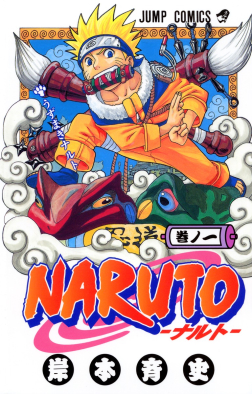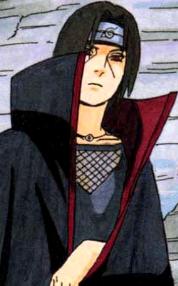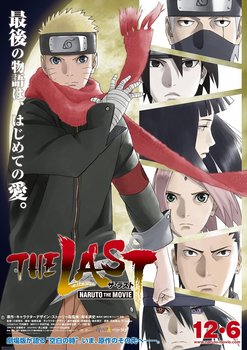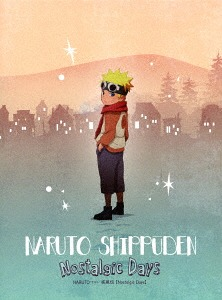
Naruto is a Japanese manga series written and illustrated by Masashi Kishimoto. It tells the story of Naruto Uzumaki, a young ninja who seeks recognition from his peers and dreams of becoming the Hokage, the leader of his village. The story is told in two parts: the first is set in Naruto's pre-teen years, and the second in his teens. The series is based on two one-shot manga by Kishimoto: Karakuri (1995), which earned Kishimoto an honorable mention in Shueisha's monthly Hop Step Award the following year, and Naruto (1997).

Naruto Uzumaki is the titular protagonist of the manga Naruto, created by Masashi Kishimoto. He is a ninja from the fictional Hidden Leaf Village. As a boy, Naruto is ridiculed and ostracized on account of the Nine-Tailed Demon Fox—a malevolent creature that attacked Konohagakure—that was sealed away in his body. Despite this, he aspires to become his village's leader, the Hokage, in order to receive their approval. His carefree, optimistic, and boisterous personality enables him to befriend other Konohagakure ninja, as well as ninja from other villages. Naruto appears in the series' films and in other media related to the franchise, including video games and original video animations (OVA), as well as the sequel Boruto: Naruto Next Generations, where he is the Hokage, and his son, Boruto Uzumaki, is the protagonist.

Sakura Haruno is a fictional character in the Naruto manga and anime series created by Masashi Kishimoto. Sakura is depicted as a kunoichi affiliated with Konohagakure and a part of Team 7, which consists of herself, Naruto Uzumaki, Sasuke Uchiha, and their sensei Kakashi Hatake. Besides the main series, Sakura has appeared in several pieces of the Naruto media, most notably the spin-off Naruto: The Seventh Hokage and the Scarlet Spring (2015) and the sequel Boruto: Naruto Next Generations (2016) where she married Sasuke Uchiha taking name of Sakura Uchiha and is the mother of their daughter, Sarada Uchiha.

Sasuke Uchiha is a fictional character in the Naruto manga and anime franchise created by Masashi Kishimoto. Sasuke belongs to the Uchiha clan, a notorious ninja family, and one of the most powerful, allied with Konohagakure. Most of its members were massacred by Sasuke's older brother, Itachi Uchiha, before the series began, leaving Sasuke as one of the few survivors. Despite becoming empathetic toward his teammates Naruto Uzumaki and Sakura Haruno, Sasuke's feelings of powerlessness force him to abandon his friends and his home in his quest to become stronger, and to find Orochimaru. Sasuke appears in several of the series' animated feature films and related media, including video games, original video animations (OVAs), and Boruto: Naruto the Movie (2015) and its manga sequel, Boruto: Naruto Next Generations (2016), in which he is depicted as a vigilante supporting his village and a mentor to Naruto's son Boruto Uzumaki.

Gaara of the Desert (我愛羅) is a character in the Naruto manga and anime series created by Masashi Kishimoto. Originally debuting as an antagonist, Gaara is a shinobi affiliated with Sunagakure and is the son of Sunagakure's leader, the Fourth Kazekage. He was born as a demon's host as part of his father's intention to have a weapon to restore their village. However, a combination of being ostracized by the Sunagakure villagers, his early inability to control the Tailed Beast, and the notion that his deceased mother called him her curse on the village caused Gaara to become a ruthless killer who believes his own purpose is to kill his enemies. Only after meeting Naruto Uzumaki does Gaara earn a change of perspective, as he eventually becomes Sunagakure's Fifth Kazekage and gains acceptance by his people. Gaara has appeared in several pieces of Naruto media, including two of the featured films in the series, the third original video animation, and several video games.

Shikamaru Nara is a fictional character in the manga and anime franchise, Naruto, created by Masashi Kishimoto. In the manga, Shikamaru is a shinobi affiliated with the village Hidden in the Leaves. He is a member of Team 10, a group of ninja consisting of himself, Choji Akimichi, Ino Yamanaka, and team leader Asuma Sarutobi. Shikamaru is portrayed as a lazy character, unwilling to apply his prodigious intelligence; Kishimoto has noted that he likes Shikamaru due to his easygoing nature. Outside the Naruto anime and manga, Shikamaru has appeared in several other media in the franchise, including video games, original video animations, and six feature films.

Orochimaru (大蛇丸) is a fictional character from Naruto, a manga series created by Masashi Kishimoto. Orochimaru is a former ninja from the village of Konohagakure who is well known for work in wars which earned him the title of Sannin and becomes a terrorist as a means to cheat death, and built his own ninja village Otogakure. He succeeds to some extent in obtaining immortality by transferring between different host bodies, which became one of his driving motivations throughout the series as he targets Sasuke Uchiha for his genetic heritage. By the events of Boruto: Naruto Next Generations, he has seemingly redeemed himself and has sent his experiment Mitsuki to Konoha to become a ninja. Orochimaru has appeared in media outside the Naruto anime and manga, including several video games.

Itachi Uchiha is a character in the Naruto manga and anime series created by Masashi Kishimoto. Itachi is the older brother of Sasuke Uchiha, and is responsible for killing all the members of their clan, sparing only Sasuke. He appears working as a terrorist from the organisation Akatsuki and serves as Sasuke's greatest enemy.

Kakashi Hatake is a fictional character and one of the main protagonists in the Naruto manga and anime series created by Masashi Kishimoto. In the story, Kakashi is the teacher of Team 7, consisting of the series' primary characters, Naruto Uzumaki, Sasuke Uchiha, and Sakura Haruno. Kakashi's past has been extensively explored in the series, resulting in a gaiden being devoted to his past experiences. Kakashi has appeared in several pieces of Naruto media, the featured films in the series, the original video animations, and the video games.

Obito Uchiha, also known by his alias Tobi (トビ), is a character in Masashi Kishimoto's manga Naruto. He is first introduced in a "Kakashi Chronicle" side story, as a young ninja who sacrifices himself to save his friends from a cave-in. Although he was believed to have died in the 3rd Great Ninja War, Obito is later revealed as the real leader of the organization known as the Akatsuki, mainly acting behind the scenes for a majority of the group's tenure. He uses the alias of Tobi and later that of his benefactor, Madara Uchiha, and conceals his true identity with masks. As the leader of Akatsuki, Obito seeks to harness the power of the Tailed Beasts in order to cast a genjutsu that will put all of humanity into an idealized dream state forever, having lost faith in the real world following Rin's death. Obito was the strongest character in the Naruto series as he was handling Might Guy, Kakashi Hatake, Naruto Uzumaki [KCM] and killer bee all by himself making him truly a formidable opponent. Obito serves as the main antagonist of the series, being the primary person at fault for the tragic backstory of series protagonist Naruto Uzumaki, whose personality and motivations are nearly identical to those of Obito's younger self, making them foils.

Naruto Shippuden the Movie: Bonds is a 2008 Japanese animated martial arts fantasy film based on Masashi Kishimoto's manga and anime series. Released on August 2, 2008, it was announced in Weekly Shōnen Jump along with the DVD release date for the first Shippuden film. The trailer for the second film aired with episodes 40 and 41, and again with episode 66 and 67. In episodes 70 and 73 the opening sequence was replaced with footage from the film. Its English version was released on DVD and Blu-ray on October 25, 2011 in North America. The film's theme song "No Rain No Rainbow" is performed by Home Made Kazoku. The movie is set after episode 71.

Naruto Shippuden the Movie: The Will of Fire, is a 2009 animated martial arts fantasy film and the sixth Naruto film overall and the third Naruto: Shippuden film, takes as its basis the popular anime and manga series. Released on August 1, 2009 in theaters in Japan, it uses the advertising tagline Todoke, ore-tachi no Omoi!.

The first season of the Naruto: Shippuden anime series is directed by Hayato Date, and produced by Pierrot and TV Tokyo. They are based on Part II for Masashi Kishimoto's manga series. The season is set two and a half years later, with Naruto Uzumaki and his team rescuing the Fifth Kazekage Gaara from the criminal organization Akatsuki. The first season aired from February to October 2007 on TV Tokyo. It was also released on DVD in Japan over eight discs between August 1, 2007, and March 5, 2008, under the name Kazekage Rescue. There is also a special feature included with the seventh Naruto: Shippuden compilation DVD based on the second ending of the series called Hurricane! "Konoha Academy" Chronicles.

The sixth season of the Naruto: Shippuden anime series is directed by Hayato Date, and produced by Studio Pierrot and TV Tokyo. They are based on Part II for Masashi Kishimoto's manga series. The sixth season aired from June 2009 to January 2010 on TV Tokyo. The season follows Sasuke Uchiha taking revenge against Itachi to avenge their clan. It also features two arcs focusing on the background stories for Kakashi Hatake and Jiraiya. The season is referred to by its DVDs as the chapter of Master's Prophecy and Vengeance released by Aniplex.

The first season of the Naruto anime television series is directed by Hayato Date, and produced by Pierrot and TV Tokyo. Based on Masashi Kishimoto's manga series, the season follows Naruto Uzumaki living in the Hidden Leaf Village, determined to become the next Hokage and gain the respect of the villagers. The first season ran from October 3, 2002, to May 28, 2003, on TV Tokyo and its affiliates.

The Last: Naruto the Movie is a 2014 Japanese animated action-romance film produced by Studio Pierrot and directed by Tsuneo Kobayashi. It is the tenth film based on Masashi Kishimoto's manga and anime Naruto. It stars Junko Takeuchi, Nana Mizuki, Chie Nakamura, Showtaro Morikubo, Satoshi Hino, Kazuhiko Inoue and Noriaki Sugiyama. Set after the finale of the Naruto Shippuden series, the film focuses on Naruto Uzumaki's ninja team as they go on a mission to stop the moon from falling, and rescue Hanabi Hyuga — Hinata Hyuga's sister — from Toneri Otsutsuki, a man who wishes to marry Hinata and punish mankind for weaponising chakra.

The episodes for the seventeenth season of the anime series Naruto: Shippuden are based on Part II for Masashi Kishimoto's manga series. The season continues with the repentant Sasuke Uchiha joining with Naruto Uzumaki, Sakura Haruno, Kakashi Hatake and the allied shinobi forces to battle against Madara Uchiha and Obito Uchiha. The episodes are directed by Hayato Date, and produced by Pierrot and TV Tokyo. The season aired from May to August 2014.

The twenty-second and final season of the Naruto: Shippuden anime television series is based on Part II of Masashi Kishimoto's Naruto manga series. The first four episodes are anime–exclusive material that examine the childhoods of some main characters under the title Nostalgic Days, while the rest of the season covers stories based on light novels set after the manga's ending, respectively titled Sasuke Shinden: Book of Sunrise, Shikamaru Hiden: A Cloud Drifting in Silent Darkness, and Konoha Hiden: The Perfect Day for a Wedding. The episodes are directed by Hayato Date and produced by Pierrot and TV Tokyo. The season aired from October 2016 to March 2017.





















